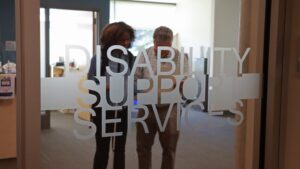Accessibility & Disability Support on the Heights

At Le Moyne, we welcome people with disabilities and emphasize the education of the whole person, the importance of service and leadership and the promotion of a more just society. Our accessibility and disability support office is here to help you navigate any challenge you face.
Did you have an IEP in high school? Or were you granted extra time for exams? We can help your services set up to make your college experience successful.
What Services Does the Disability Support Services (DSS) Office Provide?
Some of the ways we can offer students with learning, psychological, medical and/or physical (temporary or permanent) disabilities include:
- Providing and/or arranging academic accommodations
- Reviewing previously administered diagnostic tests
- Making referrals to appropriate diagnosticians
- Providing supplemental academic advising
- Assisting students in developing self-advocacy skills
- Providing liaison and advocacy measures between students and faculty


Visit Our Office in the Library
You can stop by any time, but it’s always good to make an appointment at dss@lemoyne.edu if you need to speak with someone.
DSS Hours
(Note: Evening hours start the third week of the semester.)
| Monday – Thursday | 8:30 a.m. – 9 p.m. |
| Friday | 8:30 a.m. – 4:30 p.m. |
Learn how to start working with us today!
Here are some basic steps to get started setting up services at Le Moyne. You can always call us or stop by regarding your specific accommodations.
- Once admitted, students are provided with the opportunity to self-identify as a student with a disabling condition on the New Student Checklist and/or Heading to the Heights sent out by the college’s Office of Admissions or Orientation committee. They will receive an email with a link to complete a form located in the student AIM portal https://sierra.accessiblelearning.com/Lemoyne/
- Students are also informed in the Disability Services letter that they may request accommodations during the orientation sessions to complete any placement exams.
- Upon receiving a student’s documentation and intake application, a file is set up in DSS. Once DSS sets up a file, a student will meet with the Director to do a formal meeting (accommodation interview) and find out which accommodations fit each individual student. Then, each semester, the Director may meet with the student with disabilities in order to adjust their academic accommodations (if necessary) for the semester, as they relate to their particular courses.
- On some occasions, meetings are arranged between students and faculty prior to the start of classes in order to address course expectations and student needs as they relate to their disability (e.g. a student with a hearing impairment who needs to address communication issues with the professor).
- In situations where students have a significant disability that would require special attention in the event of an emergency, appropriate offices are notified of the student’s classroom and residence hall location each semester.
- Students and faculty may meet with the Director of Disability Support Services as needed throughout the semester with any questions or for additional assistance.
Current adaptations and services at Le Moyne include:
- Alternate testing locations
- Time extensions for quizzes and exams
- Alternate exam formats
- Note taker services
- ETexts/Digital texts
- Preferential seating
- Adaptive furniture
- Access to adaptive technology
Adaptive technology includes:
- CCTV
- Co:Writer
- Dragon Naturally Speaking
- Duxbury Braille Translation
- Eclipse Reader
- Inspiration
- Jaws
- Kurzweil 1000
- Kurzweil 3000
- OmniPage
- Word Processing
Note: Adaptive technology is available to you whenever the library is open. For assistance in learning to use programs, make an appointment with DSS staff during office hours.
Institutions don’t have to provide an academic adjustment that would alter or waive essential academic requirements or, fundamentally alter the nature of a service, program or activity or result in undue financial or administrative burdens considering the institution’s resources as a whole.
For example, an appropriate academic adjustment may be to extend the time a student with a disability is allotted to take tests, but an institution is not required to change the substantive content of the tests.
http://www2.ed.gov/about/offices/list/ocr/transition.html
It’s highly recommended that you do disclose your disability so you can receive services; however, no Le Moyne College student is required to disclose their disability.
If you choose not to disclose your disability, you’re not eligible to receive accommodations for your disability. If you want academic accommodations or accessibility aid, you must identify yourself as having a disability. If you are not in need of services, you may choose not to disclose your disability.
If you do disclose your disability, DSS must be given enough time to implement the accommodations. Some accommodations take significantly more time to arrange. Students should not wait until after receiving a poor grade in a class to disclose a disability.
While efforts will be made to provide appropriate support to accommodate disabilities, the same accommodations offered to high school students won’t necessarily be offered at Le Moyne. Here’s the legal information on the differences in service between high school and college.
What is the law?
High school: Individuals with Disabilities Education Act (IDEA) and Section 504 of the Rehabilitation Act
College: Americans with Disabilities Act (ADA) and Section 504 (Subpart E)
What is the intent of the law?
High school:
IDEA: To provide a free, appropriate public Education in the least restrictive environment.
504: To ensure that no otherwise qualified person with a disability is denied access or is subjected to discrimination in any program or activity provided by any public school or entity.
College: To ensure that no otherwise qualified person with a disability is denied access or is subjected to discrimination in any program or activity provided by any public school or entity.
Who is covered under the law?
High School: All children 0-21 (or until graduation from high school), that require special education services.
College: dss@lemoyne.edu All qualified individuals with disabilities who meet the admissions requirements or entry criteria for a particular program and can document the existence of a disability as defined by the ADA.
Who is responsible for identifying and documenting the disability?
High School: School districts are responsible for identifying students with disabilities and providing special instruction, individualized education plans, and/or accommodations.
College: Colleges do not have to assess the student. Students are expected to provide proof of a disability within the institutional guidelines.
What about course waivers?
High School: Some courses may have been waived for a student before graduation, if they were specifically related to the student’s disability.
College: Substitutions for specific graduation requirements may be requested by following a rigorous petition process, including “waivers” for requirements. Substitutions may be considered only after the student has provided adequate verification to the Disability Resource Center of their disability and unsuccessfully attempted the course in question with the appropriate accommodations.
You’ll receive a letter from DSS after your deposit and self-identification which will include a packet explaining the required documentation that must be put on file in the DSS office to receive accommodations. All accommodations are determined on a case-by-case basis.
Here are the expectations of students receiving accommodations each semester in DSS:
- Share accommodation letter with current semester instructors using the AIM Portal
https://sierra.accessiblelearning.com/Lemoyne/ - Speak with each of your professors concerning your needs. This is one of the most important responsibilities you have.
- Be assured that the information you share with your professor concerning your disability is strictly confidential, and you should expect that what you say won’t be shared with anyone else at the college.
- Timing is a very important factor in terms of communicating with your professors. Do it early in the semester, and in collaboration with DSS, to ensure your academic success from the first day of classes.
Please note:
- Students failing to identify their disability or arrange for special accommodations in the first few weeks of class assume responsibility for regular classroom procedures.
- If you self-identify later in the semester, you must assume responsibility for the grade(s) achieved in class without accommodations prior to that time.
No, Le Moyne doesn’t provide diagnostic testing services. It’s your responsibility to seek out and pay for independent testing. DSS can provide a reference list of area professionals who conduct private testing services.
“If a student with a disability is eligible for services through the state VR Services program, he or she may qualify for an evaluation at no cost.” – http://www2.ed.gov/about/offices/list/ocr/transition.html
DSS maintains the safety and privacy of our students’ records and follows the Registrar Records Retention Policy. Records are not released without your written permission.
Questions? We're Here to Help!
Christine Oswalt
Non-Discrimination Statement
Le Moyne College welcomes people with disabilities and, in compliance with Section 504 of the Rehabilitation Act of 1973, as amended, and the Americans with Disabilities Act of 1990, does not discriminate on the basis of disability.
Le Moyne subscribes fully to all applicable federal and state legislation, and the office of Disability Support Services (DSS) conducts itself both in keeping with the law and with the college’s mission statement. Le Moyne emphasizes the education of the whole person, the importance of service and leadership, and the promotion of a more just society. Academic accommodations for students with disabilities are coordinated by the office of Disability Support Services.
Le Moyne College does not discriminate on the basis of race, color, gender, creed, age, disability, marital status, sexual orientation, veteran status, or national or ethnic origin.
Le Moyne College is an Affirmative Action/Equal Opportunity Employer.
For other inquiries relative to the regulations mentioned above may be addressed to Shaun Crisler, Associate Provost of Student Development, at 315-445-4525.


